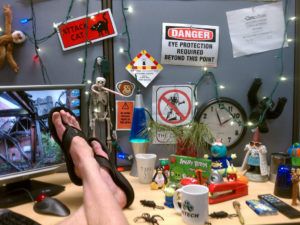5 Dirtiest Places In The Office

Although you may feel like you spend enough time at the office to call it home, it's important to remember that it's a public, shared space (and that you have a real home).
Floors are walked on by dozens of shoes that have been hundreds of places, toilets are flushed by countless hands, and elevator buttons are pushed by who-knows-how-many fingertips. Even if your office looks sparkling clean, we promise that there are unseen germs lurking all over.
Here are the dirtiest places in your office:
- Break room sinks. In a study of over 5,000 surfaces, 91% of workplace sinks had bacterial levels high enough to require disinfectant. No matter where you work, your sink is likely to be touched by many different hands, and the addition of food and water makes the sink an ideal place for microbes to flourish.
- Microwave and refrigerator door handles. Just like the sink, the combination of food and many hands makes these places especially dirty. And, because you're most likely eating your lunch after opening the fridge, you can easily become in contact with these germs.
- Keyboards. The grooves in the keys are excellent at trapping dust, dirt, and lint. And if you eat at your desk, those crumbs will get caught as well. Make sure to wipe down your keyboard on a regular basis, even if you're the only one using it.
- Desk phones. Just like your keyboard, desk phones can easily trap dust and dirt. And, your phone has probably been used by many former colleagues, so wipe it down on a weekly basis before touching it to your face.
- The coffee pot. This iconic part of the workplace is unfortunately also one of the grimiest because so many people use it. We recommend cooking a pot at home or, if you feel brave enough, cleaning the work pot out before you use it.
Most of the dirtiest places at work are the ones shared or used by many people. These include things like kitchens, vending machines, and elevators, which can all be avoided by packing your own lunch or washing your hands after contact. By staying away from germy areas, you could save yourself from nasty colds and costly trips from the doctor.
Keep your home healthy! Call Zerorez!